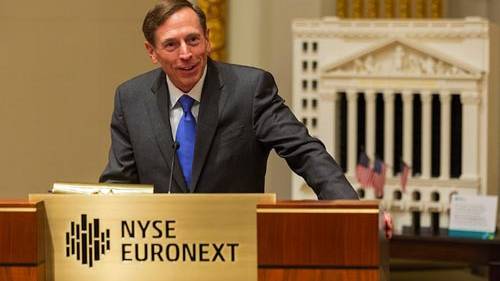One more layer of Benghazi buried? Petraeus Resigns From CIA, Citing Extra-Marital Affair
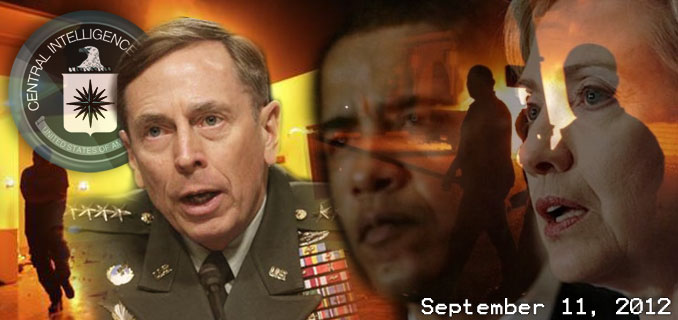
November 9, 2012:
ABCNews:
David Petraeus Resigns From CIA, Citing Affair
CIA Director David Petraeus has resigned his position, citing personal reasons and an extramarital affair.
"Yesterday afternoon, I went to the White House and asked the president to be allowed, for personal reasons, to resign from my position as D/CIA," he said in a statement. "After being married for over 37 years, I showed extremely poor judgment by engaging in an extramarital affair. Such behavior is unacceptable, both as a husband and as the leader of an organization such as ours. This afternoon, the president graciously accepted my resignation."
Petraeus, a former Army general who led the surge into Iraq under former President Bush and also led U.S. troops in Afghanistan before taking over the CIA, is one of the most respected and influential generals of his time. His wife, Holly, has worked with the Obama administration to help military families.
"As I depart Langley, I want you to know that it has been the greatest of privileges to have served with you, the officers of our Nation’s Silent Service, a work force that is truly exceptional in every regard. Indeed, you did extraordinary work on a host of critical missions during my time as director, and I am deeply grateful to you for that," Petraeus said in the statement, adding that, "Teddy Roosevelt once observed that life’s greatest gift is the opportunity to work hard at work worth doing. I will always treasure my opportunity to have done that with you and I will always regret the circumstances that brought that work with you to an end."
In a statement, National Intelligence Director James Clapper praised Petraeus, who turned 60 two days ago, for his years of service.
[...]
Read the full article at: abcnews.go.com
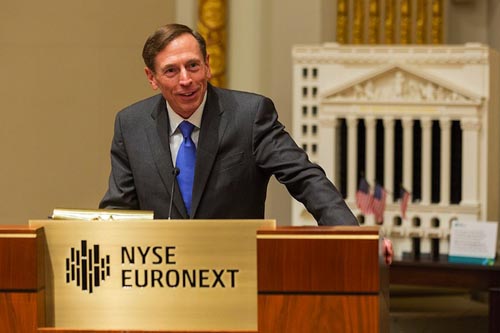
Former CIA Director David Petraeus rings the opening bell of the New York Stock Exchange, Sept. 18, 2012.
November 9, 2012:
House Committee: Benghazi hearing proceeds without Petraeus
By Hope Hodge | HumanEvents.com
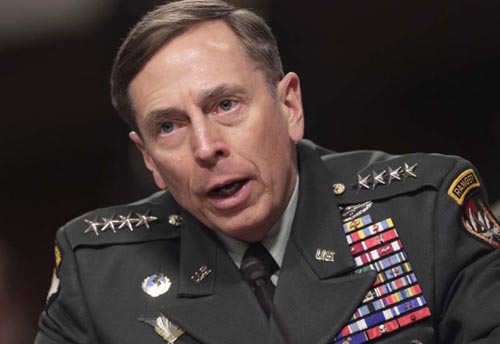
Amid shocking revelations that CIA director David Petraeus resigned his post in the wake of an extramarital affair, staff at the House Intelligence Committee said a hearing at which Petraeus was supposed to testify regarding deadly attacks in Benghazi, Libya is expected to proceed as scheduled.
According to breaking news reports Friday, Petraeus sent a letter of resignation to President Barack Obama, effective immediately, admitting “poor judgment” in conducting an extramarital affair.
“Such behavior is unacceptable, both as a husband and as the leader of an organization such as ours,” Petraeus wrote in the letter, obtained by the Wall Street Journal.
This alleged personal scandal comes on the heels of allegations that Petraeus, a four-star Army general and former commander of U.S. forces in Afghanistan, may have failed to respond adequately to calls for help from CIA operatives amid the terrorist attacks on the U.S. consulate in Benghazi that killed four Americans on Sept. 11.
Petraeus was among a panel of security leaders, including Director of National Intelligence James Clapper and National Counterterrorism Center director Matthew Olson, set to testify in a closed-door hearing of the House Intelligence Committee, according to a witness list released yesterday.
Following Petraeus’s announcement, a spokeswoman for the committee said that the hearing is expected to proceed as scheduled, though the CIA director’s immediate resignation will likely change the witness list. It’s not immediately clear if the CIA will send a replacement witness to testify, though CIA Deputy Director Mike Morell, now acting director is reportedly in line for Petraeus’s position.
This afternoon, Obama also released a statement, which congratulated Petraeus on his service but did not hint at political controversy.
“David Petraeus has provided extraordinary service to the United States for decades,” he said, “By any measure, he was one of the outstanding General officers of his generation, helping our military adapt to new challenges, and leading our men and women in uniform through a remarkable period of service in Iraq and Afghanistan, where he helped our nation put those wars on a path to a responsible end.”
Petraeus has been a well-respected figure on both sides of the political aisle. The Drudge Report hinted earlier in the campaign season that Republican presidential contender Mitt Romney might pick the general for his vice presidential running mate, while others theorized he might be an exciting, if unexpected, choice for Secretary of State in a Romney administration.
Article from: humanevents.com
November 2, 2012:
Newest Benghazi Scapegoat: CIA’s David Petraeus
By Spencer Ackerman | Wired.com
There’s an unexpected casualty of the September assault on the U.S. consulate in Benghazi, Libya: the reputation of David Petraeus, the celebrated Army general turned CIA director. For among the first times in his career, a bureaucratic effort to throw Petraeus under the bus is showing through in the press.
Last week, a Fox News story portrayed the CIA as doing practically nothing while the consulate burned. The CIA pushed back against that on Thursday, telling reporters that two different CIA teams, one on hand at the Benghazi compound and the other rushing in from Tripoli, played an active role in repelling the hours-long assault that ultimately left four Americans dead. But not everyone is happy about the CIA’s performance — including that of its director.
The Wall Street Journal cites several anonymous officials who go after Petraeus hard. The CIA, operating out of an “annex” near the 13-acre consular compound, dwarfed the regular diplomatic presence in Benghazi, with the mission of hunting down ex-dictator Moammar Gadhafi’s unsecured rockets and missiles. That apparently led to an expectation at the State Department that the CIA would secure the compound in the event of a disaster, which never congealed into a formal arrangement. The next month, after a contentious congressional hearing, the Journal reports that officials “were surprised” Petraeus attended a screening of the film Argo, a celebration of a CIA success.
The complaints compile: unlike predecessor Leon Panetta after the 2009 attack on a secret base in Afghanistan, Petraeus kept the CIA’s Benghazi role in the shadows. The Journal’s sources portray Petraeus as shielding the agency from embarrassment; keeping the agency’s role in Benghazi a secret even from top-level officials; and leaving Secretary of State Hillary Rodham Clinton to phone Petraeus directly as the attack proceeded in the hope of getting real-time intelligence.
And while the Journal piece doesn’t mention it, there’s a possible policy element to the discrepancy between the State Department and CIA. The CIA had 10 people to protect its annex in Benghazi, but the State Department relied on a previously obscure British firm, Blue Mountain, to guard the entire compound. Blue Mountain paid its Libyan guards $4 an hour. It’s speculative, but the State Department’s expectation that the CIA would be “the cavalry” in an assault, as an anonymous official tells the Journal, might have contributed to State’s relatively lax security posture at the consulate.
It’s worth noting that, in the CIA’s telling, the agency did come to the compound’s aid. One CIA team, at the annex inside the compound, prepared an extraction mission within 25 minutes of the attack beginning, arming itself with heavy weapons and lining up a vehicular fleet to extract personnel while dodging rocket-propelled grenades, mortars and thick smoke. A second team raced to Benghazi from Tripoli, toting a suitcase full of cash to commandeer a plane ride, and arrived about three hours later owing to Libyan officials who wanted Libyan security officers on the scene. Ultimately, the extraction proceeded without U.S. Ambassador Christopher Stevens, who was lost in the chaos and died, apparently at Benghazi Hospital.
Petraeus is not used to being under the bus. His record commanding the surge in Iraq has given him a tremendous reputation, within official Washington and beyond. Politicians and the press tend to downplay his missteps, such as his less-than-impressive record training Iraqi security forces and the stalemate that persists in Afghanistan despite Petraeus’ year in command. Additionally, there is some concern that under Petraeus, the CIA is focused too much on counterterrorism and insufficiently on its broader intelligence mission, although the CIA denies that’s the case.
It’s unclear what Petraeus’ future holds, either in a second Obama term or a Romney administration. Regardless, congressional investigation into Benghazi is expected to accelerate after next week’s presidential election, including a closed-door hearing in two weeks by the Senate intelligence panel. Petraeus may have more tire-treadmarks on the back of his suit jacket before the Benghazi inquiries conclude.
Article from: wired.com
October 16, 2012:
Clinton Accepts Blame for Benghazi
By Monica Langley | WallStreetJournal
U.S. Secretary of State Hillary Clinton said she takes responsibility for security at the American diplomatic outpost in Benghazi, Libya, where Ambassador Christopher Stevens and three other Americans died in an attack last month.
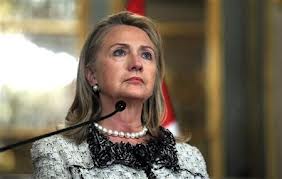 "I take responsibility," Mrs. Clinton said in a recent interview in her office. "I’m the Secretary of State with 60,000-plus employees around the world. This is like a big family…It’s painful, absolutely painful."
"I take responsibility," Mrs. Clinton said in a recent interview in her office. "I’m the Secretary of State with 60,000-plus employees around the world. This is like a big family…It’s painful, absolutely painful."On Monday, in Lima, Peru, she also told television interviewers that she accepts the blame, adding that security at America’s diplomatic missions overseas is her job, not that of the White House.
Her comments come as Republicans, including presidential candidate Mitt Romney, criticize the Obama administration for its handling of the security before the attack by extremists and its explanations afterward.
She also spoke in advance of the second presidential debate, which will occur Tuesday night. Both security arrangements in Benghazi and the administration’s differing explanations of whether the attack was the result of mob violence caused by an anti-Muslim video or a calculated terrorist strike were the subject of disagreement in last week’s debate between Vice President Joe Biden and Rep. Paul Ryan, the Republican vice presidential nominee.
[...]
Read the full article at: wsj.com
